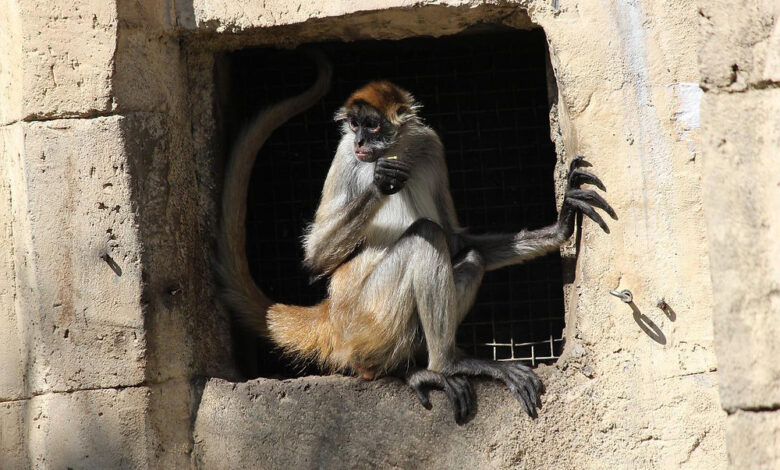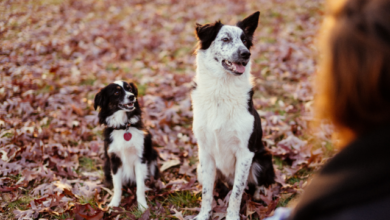Monkey Business (an excerpt)

As I passed the barn, I saw the bison field on the right. Five majestic animals were grazing in a field covered with fog that made them look like they were walking on clouds.
I heard the strange gibbons howling again. If I don’t keep an eye on the building, those calls will alert me that I’m approaching. Monkey yards are fenced around a central building, which houses their indoor enclosures. The entire area has a larger fence surrounding it to prevent zoogoers from coming into direct contact with the animals. If they stuck their fingers in the outer fence, there would still be a distance of two feet between their knuckles and the monkeys’ inner fence. As I approached, I could see the outer gate wide open. I took it as an invitation and walked in while I called, “Hello? Lisa?”
Lisa is a short, brown-haired, petite woman with a ready smile and firm handshake. At five feet eight inches, I’m taller than her. She greeted me sincerely when I told her my name, and she seemed genuinely grateful for my presence.
“I’m happy to have a volunteer!” she speaks. “And I don’t just say that; I cannot do my job without your help. How often can you come?”
She is so friendly and enthusiastic, I can’t help but smile back at her when I reassure her: “I hope to come every Saturday.”
“Perfect,” she said. “Anytime you can give is appreciated. I have a regular volunteer, but she recently left the state. Navy wife,” she said to explain.
We live in a transient area where there are large military bases. Families often come and go and the term “Navy Wife” is common.
“Okay, let’s get started. Would you like to meet some monkeys? she asked with a shy smile. I nodded and followed as she quickly moved into the protected rear area.
We passed the indoor housing complex divided into three sections. Each unit has a food dish and water bottle, ropes for swinging and hanging, and a base for lying down. Currently, no monkeys have been seen.
Lisa motioned for me to continue following her, “Get out, and I’ll introduce you,” she said as we continued walking and walked through the outside area around the monkey yard.
“These are Monkers,” she said, referring to the largest spider monkey that had rushed to greet her, pressing its small belly against the fence. Lisa whispered to him while she scratched his stomach, “Who’s my little Monk-Monk?” It’s obvious that she has a crush on this handsome guy.
“Monkers are about twenty-two years old,” she said, glancing at me to see my reaction.
“Wait, twenty-two? He’s as old as me!” I told her.
I couldn’t think of the fact that this little monkey probably lived in the zoo as long as I lived. I don’t know if he was born here or caught in the wild, which I have only realized with the simple knowledge of his age. I’m not sure which is worse, having freedom and then losing it, or never discovering it.
“Is he always at this zoo?” I timidly asked because I wasn’t sure how open she would be to answering my questions, or how open I would be to her answers.
“I’m not sure…” she hesitated, “but it’s the oldest spider monkey I’ve ever met. I’ve only been here a few years, though,” she said with a thought. “You want to scratch him?” “Yes, sure,” I replied as I reached out and began to rub the soft fur on its belly. He loves attention, and when he presses himself against the fence, he makes soft grunts. Lisa said that she thought he “caught” me. I was hoping so. I was definitely done with him.
I’ve met all the other spider monkeys, but it’s hard to keep track of their names. I told myself I would remember better with time, and I did. The one who stood out from the rest, aside from old Monkers, was Rosie. She was pregnant.
“So they let them have children here?” I ask.
“We don’t prevent pregnancy,” she said. She added: “Infants are great for bringing crowds to the zoo. “We will even put the animals together to encourage them to mate. Sometimes it fails. Mating is not always a certainty, or if it does, mothers may not always be able to raise their young. Animals born in captivity may not know what to do for their young because they have never been taught. The mother may not feed the child, or the father may attack their child. In Rosie’s case, Monkers is the father and he has been good to his children in the past. The other male monkey, Reggie, is not old enough to challenge the Monkers. However, it could happen one day, and we don’t know what kind of father he will be.”
“What if it doesn’t work out?” I ask. “I mean for the kids and their parents?”
“We will separate the young and raise them ourselves. Usually, one of the handlers will help by taking them home to feed them nightly. Then we will reintroduce them when they get older or sell them to another zoo,” she explains.
I never thought of it – zoos sell animals to other zoos. It seems like a lot of the things I’m learning have never happened to me before.
taken from The Age of Spider Monkeys: And Other Revelations From Behind the Zoo.





